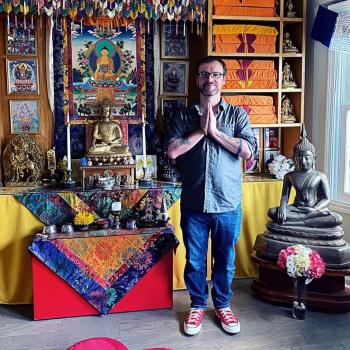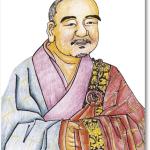I want to talk about the four foundations of mindfulness today.
This is based on a talk that was given by the Buddha. It’s sort of important because the things we call mindfulness meditation or insight meditation are really based on this talk. The teachings of the four foundations are really present in all of Buddhism and also in what we call modern mindfulness, where they try not to say the word Buddhism and try not to talk about the Buddha, but they’re still doing these things.
These are the original underlying principles of meditation and where it’s taking us. We’re going to talk about how we can use these principles to improve our daily lives, deepen our mindfulness, and move closer to our spiritual goals.
The basic idea between all of this is simple: we’re training to become more aware. More aware of what we do with our bodies, our feelings, our thoughts, and our environment. Everything, really. This gives us insight into why we do the things we do, and how we can live our lives in a better way.
The fact of the matter is, a lot of the time in life we just do things, and we don’t think about why we’re doing things. We just do things, and things happen. I like to say we sleepwalk through life. We just don’t worry about it, and that can lead to some poor decisions at times. We can learn to recognize when our actions come from a good place, or a bad place. We can learn to see what helps us and what gets in our way.
We’re training to be present so we’re not so obsessed with the past and the future all the time.
I’m going to share this quote from the Buddha that these teachings come from, and it’s going to be a little heavy, but it’s okay. We can read it, I hope.
The Buddha said, “Come friends, dwell contemplating the body in the body, ardent, clearly comprehending, unified with concentrated one-pointed mind, in order to know the body as it really is. Dwell contemplating feeling in feelings, in order to know feelings as they really are. Dwell contemplating mind in mind, in order to know mind as it really is. Dwell contemplating phenomena in phenomena, in order to know phenomena as they really are.”
People usually call that last one dharmas, or dhamas, which just means “things” in this context. So, I made it phenomena because if I just say, “Contemplate things in things,” that doesn’t mean very much.
Cultivating mindfulness of these four things is helpful to anyone. It’s supposed to be a teaching for any level on the path, so if you’ve been meditating a long time, this is supposed to be useful to you, and if this is your first time, this is also supposed to be useful to you.
Again, we want to be mindful of body, feelings, mind, and phenomena. Feelings are sometimes called sensations. When we have an opinion about something. Mind is not only what we identify as ourself, but our thought processes and the baggage we’re carrying, all that stuff.
One by one.
Body. When we’re mindful of the body, we recognize it’s not a unified thing, it’s more a collection of parts. That is, you can get a heart transplant and have a new heart, you’re still you. We don’t think of our bodies like that, but we’re just parts coming together, and our parts are together for a while, and then our parts are not together anymore.
Being mindful of the body is placing our attention on each part. I can just sit and bring my attention to my face, feel how my face feels. Then bring my attention to the rest of my head, feel how it feels. And then my shoulders, my arms, my back. This helps us see the body as it is. It’s a form that is around for a little while and then it goes, and usually it starts to go in parts.
We all have the experience that parts of our body don’t work as well as they used to, I think. I saw a meme that I really like that said, “My favorite memory of childhood is my back not hurting.”
That’s your back wearing out. Our bodies are wearing out. It’s just like the parts of my car, right? I have to get new tires soon because the tires are wearing out. Our bodies are that way, too. Slowly, we come to realize that this is a vehicle. This is not really mine, and I don’t really have control over what’s happening here. I can try really hard to have control of keeping my body together, but ultimately, it’s not a fight I’m going to win.
So, why is that helpful to us? It’s helpful to us because if we recognize that, then maybe we can stop being so obsessed with our bodies, so obsessed with giving my body what it wants. With pleasure, with, “I want to eat cake because it makes my body feel good.” If we start to think of our body as a vehicle, that’s helpful to us as far as giving in to our body’s desires all the time.
The second one is mindfulness of feelings. Again, sometimes this is called sensations. We only really notice one feeling at a time, and we usually attach labels to these. They are positive, negative, or neutral.
If we can learn to see each feeling as one of many temporary feelings, then maybe we can bring non-judgemental awareness. Feelings just are. They aren’t positive. There’s no meaning except for the meaning we put on it. Hopefully we can learn to see feelings as they are, just these fleeting things, instead of clinging so tightly all the time.
I think the language is important here. We don’t say, “I’m having the experience of anger.” We say, “I am angry.” Why is that? Why do we so completely identify with a feeling that we define ourselves by it? We say, “I am angry,” and I think that’s really powerful and meaningful, because the truth is you’re not angry. You’re just having the experience of anger. It’s going to come and be here for a little while, and it’s going to go.
Although with our feelings in particular, when we have a feeling, we tend to start to think that is going to last forever. That makes us upset. That makes it worse, because we think it’s going to last forever and we cling to it. It’s like everything else, it comes and goes. It goes faster than our body does. It goes faster than a lot of things.
My hope is that we can start to stop clinging so tightly to our feelings, and instead of saying, “I’m angry,” we can learn to say, “I’m experiencing anger right now. Right now it’s like this. What can I do about it?”
The next is mindfulness of mind. We think of our mind as a single thing. Generally, we sort of think of our mind as like the driver of our experience, and we often tend to think that our mind and body aren’t connected. They are connected.
For example, when we eat nutritious food, our minds work better. We still tend to think the mind is like the driver and the body’s like the car, but it’s really intimately connected.
More than that, when we pay attention to our minds, we realize it’s really just a flow of consciousness. A thought, and then another thought. These thoughts are influenced by our baggage and our previous experience, but it’s really just one thought, and then another thought, and they come and they go. Sometimes we don’t even know how we got to the state of consciousness we’re in.
We don’t have a mind so much as having various states of mind and thought processes. Sometimes these make sense to us, and sometimes these make no sense to us, and you’re thinking, “Why am I thinking about something that happened two years ago?” Or you’re thinking, “Why don’t I ever remember this person’s name?”
We tend to think we have some more control than we do, but it’s just a flow of thought processes, and they come, and they go. Sometimes we have a lot of control, sometimes we have very little control. Just like the feelings of the body, these are temporary. When we learn to pay attention to the arising and passing of thoughts, then the hope is that we can learn to stop the runaway train of negative thinking.
Those negative thoughts start to arise and then it’s like I can’t stop thinking about this bad thing, and now I can’t sleep. This negative thing is just pulling me around. We get that all the time. We can learn, though, how to notice, “Oh, a very bad thing is coming into my mind, I wonder if I can stop it.” Maybe we can learn to redirect. At least we can learn to remind ourselves why we’re in a bad mood, “This is because I started thinking about that thing, that thing I’m not able to help thinking about, and it’s taking me to a bad place.”
We can understand that we are not our thoughts. We are not our bodies, we are not our feelings, we are not our thoughts. We are a collection of all these things.
Last is mindfulness of phenomena. Again, it’s really the same as the first three. It’s all connected. It is seeing our life circumstance as coming and going and temporary. The environment around us, the loudness or quietness of our situation, it’s all coming and going. That helps us because often we’re obsessed with our environment. That’s not to say we shouldn’t try to make better lives for ourselves, we should. A lot of the time I think of like, if you have too many things to do and you can’t figure out which one to focus on first, so you do nothing.
That’s what I think about when we’re obsessed with our environment. Really, the environment, the world around you is all fleeting and temporary, too.
When we see these four foundations as impermanent, that everything is the result of things coming together, then we can learn to see the silence that’s at the root of things. When we see that, it helps us to gain wisdom. When we see that the body is impure and temporary and falling apart, we can stop being so attached to it.
When we see that feelings, or sense pleasures, often lead to suffering, we can stop being so attached to desire all the time. When we see that the mind is a collection of passing thoughts, maybe we don’t cling to ourselves so much. When we see that phenomena aren’t as rigid as we think, maybe we won’t be so attached to gain and loss. Things come and go.
What are we doing? We’re reflecting on how these things are really empty. When we reflect on our bodies, we can realize that the nature and form of our bodies really just arise out of other things, and they are temporary. Our bodies come and go and they change the whole time.
Feelings result from our perceptions encountering objects. Without coming into contact with something else, there would be no sensations. Your senses don’t exist in here or out there, but rather both, in the connection between the two. That’s why we say feelings are empty.
When we think about our minds, we’re really just thinking of labels. Words like “confused” or “bored” may come to mind, but these are just names and don’t really represent how our minds work. We can’t really say there’s anything enduring in our minds because things are changing all the time. We can give names to our thoughts and feelings, but those things aren’t our minds, our minds are empty.
Phenomena might be a little harder to grasp because we tend to think of it as “out there,” but all this reasoning applies to everything. It’s all emptiness, it’s all coming and going, there’s nothing but silence. When we know that, we are more free to move in the world. We are more free to make better choices. That’s ultimately what this is all about.
That’s why contemplating these things and thinking of them as impermanent and ephemeral is helpful.
That is your introduction to the four foundations of mindfulness.














